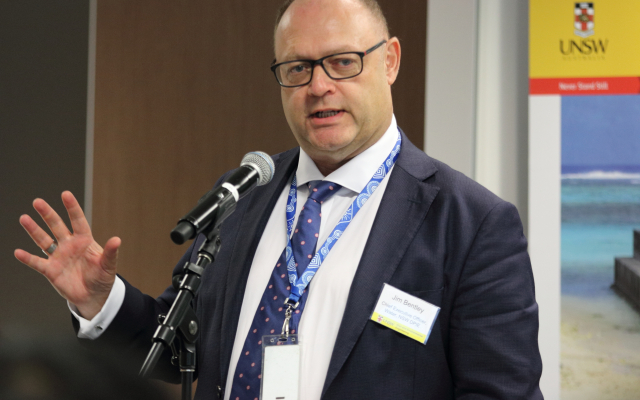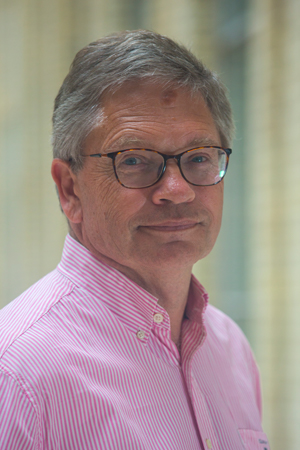
UNSW’s world-renowned Water Research Centre takes a leadership stance on planning for the long-term management of water in NSW.
Although restrictions have just been eased in Sydney, this is certainly not the time to be complacent about water. In fact, with the drought lessening in some (but not all) parts of the state, this is the perfect time to talk about better water management, so say the experts at a recent forum entitled Building Drought Resilience in NSW, held by the internationally renowned multidisciplinary UNSW Water Research Centre (WRC).
The event, held in February 2020, brought together about 100 prominent experts from academia; industry; local, federal and state government authorities; and not-for-profit community groups from rural and urban areas right across the state to discuss our current water challenges and, most importantly, explore a range of solutions. As a result of this forum, WRC will produce a comprehensive White Paper and Strategy to take to the NSW Government.
Professor Hugh Durrant-Whyte, NSW Chief Scientist and Engineer, was the keynote speaker and emphasised the importance of water as a theme running through much of his decision making, advice provision and actions.
“Water crosses numerous boundaries and is a consideration in between a third and a half of all the decisions I make. I am deeply concerned about the issues around the drought and how we plan for the long-term future,” he said.
“This is why this forum is so vital. It’s a fantastic initiative and will help the NSW Government connect the dots and deliver water resilience for the second half of the century. It’s a problem we must all solve together.”
In an ironic turn of events, the forum was held immediately after an intense rainfall event which saw the level of Sydney’s primary drinking water source – the Warragamba Dam and Lake Burragorang – surge from about 40 to 60 percent. This event followed the worst bushfire season the country has ever seen.
Robert Care is a Professor of Practice at UNSW Civil and Environmental Engineering and wryly acknowledged the paradox in his introductory address. “Australia has demonstrated once again that it is a country of drought, fire and flood,” he said.
“This forum is an important day for the Water Research Centre and all those involved in water in NSW and, indeed, Australia. Today is about listening, sharing, coming together and brainstorming innovative ideas about how to mitigate all the water issues we face.”
The day was intensively practical and solutions-focused with the two key panel events exploring the health of the land and water and drought resilience for towns and cities. Discussion topics included water sensitive urban design, water quality, sustainable management of the urban water cycle, the science of rainfall, the question of dams, restoring health to our vital wetlands and estuaries, effective and robust water resource management, and working with nature through regenerative practices, to name a few.
It is important that WRC takes a leadership role and my hope is the resulting strategy will help key decision makers build greater drought resilience resilience into the state’s water management going into the future.
Professor Denis O’Carroll, Director of the WRC
As the CEO of NSW Water, Jim Bentley holds the NSW Government’s most senior water role. As a panellist he spoke passionately about the Department of Planning, Industry and Environment’s focus on building drought resilience across the state over the long term.
“Water security is our top problem. As we adapt to these feast or famine conditions it is essential that we use data appropriately so we can best manage the water we have,” he said.
“To do this, we are building a water strategy that focuses on the question, ‘What does good water management look like in different parts of the state under different conditions?’”
Discussion groups followed each panel with participants breaking off into teams to brainstorm and generate solutions for the water challenge that interested them the most. One of these sessions was called Rehydrating the Land and was attended by Carolyn Hall, CEO of the Mulloon Institute, a not-for-profit research, education and advocacy organisation that regenerates landscapes to provide long-term water and food security.
“Today was important for people across the water industry space to share their ideas and concerns, but it’s also important for them to hear water management success stories like ours,” she said.
“We’re very passionate about our work and have significant grassroots interest from farmers. If the NSW Government is serious about drought resilience, then they need to listen to communities, farmers, and take landscape rehydration seriously, as part of the mix of the solutions.”
Professor Denis O’Carroll, Director of the WRC and the key instigator of the forum, said he was delighted with how the forum went and is looking forward to compiling the outcomes of the day into the White Paper and Strategy.
“Our next steps will be to develop the strategy and expand our efforts at communication. It’s important we get the message through to all stakeholders – from the water industries, to economists, politicians, the public and beyond,” he said. “Water is everybody’s business.”
“As a world-renowned research centre, it is important that WRC takes a leadership role and my hope is the resulting strategy will help key decision makers build greater drought resilience into the state’s water management.”
